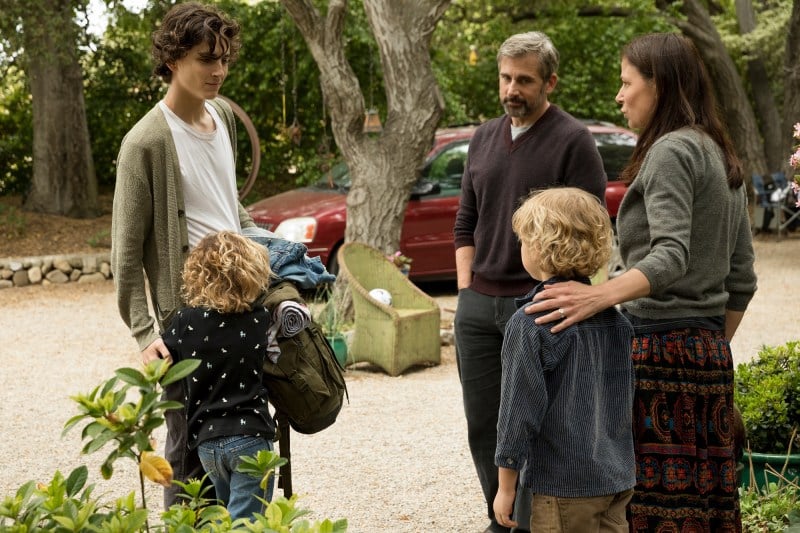“Beautiful Boy” is the story of addiction, but more importantly, it’s the story of the enduring love between a father and son. The film is based on the respective memoirs of both father David Sheff and son Nic Sheff, and these two narratives encompass the stories of both the witness to the addiction and the addicted. Both sides, aided by the breathtaking performances of Steve Carell and Timothee Chalamet, are equally moving and heart-wrenching. In a story of addiction, recovery, relapse, hope and relapse again, it’s a repeated and necessary punch to the stomach. To think it repetitive is missing the point. “Beautiful Boy” forces us to confront an incredibly pressing issue of our time. Today, a plethora of people under 20 die because they are addicted to meth.
“Beautiful Boy” begins with Nic (Timothee Chalamet) already dependent on crystal meth. His father, David (Steve Carell), finds Nic after he returns home high on meth and proceeds to take him to a juvenile addiction clinic. There, the film flickers between the past and present. Flashbacks serve to establish the relationship between Nic and his father and juxtapose it with Nic’s inevitable enslavement to the drug. The scenes of Nic as a young boy have a nostalgic but foreboding feel (the audience is already aware in what direction Nic’s life is going), which makes it all the more painful to watch him grow up. The scenes play out like small fragmented memories, which the viewer seems to be experiencing through the father’s eyes. Both the audience and David try to understand where it all went wrong. This is contrasted with scenes of the present day, where Nic sinks lower and lower into the dark and lonely hole of crystal meth. Nic struggles and gives up time after time, becoming a shell of what he was as his father stands witness. David struggles helplessly to bring his son back from the depths, paralleling a similar struggle of defeat and hope, resilience and despair.
What elevates this film beyond the story of an addiction is Carell and Chalamet’s extraordinary performances. Chalamet brilliantly embodies a highly troubled teenager. He is equal parts frustrating and endearing, effortlessly switching from pathological liar, loving brother and son, angry resentful teenager and a lonely, crumbling individual when all his masks are stripped off. Here, Chalamet plays both victim and villain – or more importantly, a victim who becomes a villain to himself. His character is perfectly established in a scene where both father in son meet up in a cafe they used to go to together in San Francisco. Here, a disheveled Chalamet switches from pleading with to antagonizing his father. A slew of emotions passes over his face in the span of minutes as he begs and demands, he just needs a little money for … something.
Carell is equally powerful in his role as Chalamet’s father. Despite his reputation as a comedic actor (“The Office,” “Crazy Stupid Love”), he is able to effortlessly and convincingly play dramatic scenes. He is raw and believable, and the audience can feel Carell’s pain and frustration. Carell’s role as the witness to Chalamet’s addiction is made more visceral by the vulnerability and nuance he adds to the character. Carell’s performance is particularly poignant when Chalamet calls him in distress from the streets of San Francisco saying that he is finally ready to go home. A conflict of emotions is expressed in Carrell’s grief ridden voice, as his character is forced to say the words that go against his very nature of a parent: “You can’t come back here right now.”
“Beautiful Boy” is a personal and intimate observation of those affected by addiction, both the addicted and their families and loved ones. Nic’s dependency on drugs not only serves to completely destroy him as an individual, but also tears apart his relationships with his family and the world. In the end, however, it is because of his father’s continued support that Nic keeps fighting. The film serves to strip drug use of any glamour while at the same time humanizing the addicted. As David reflects at the end of the film, “You can’t save them, but you can be there for them.”
Contact Emilia Diaz-Magaloni at emilia2 ‘at’ stanford.edu.
